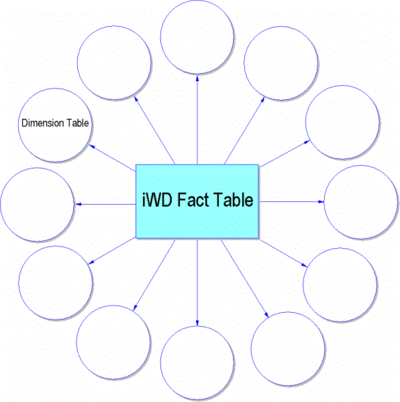Fact Tables
Fact tables in iWD Data Mart store the primary information about a task—its core, extended, and custom attributes, while the dimension tables provide structured labeling of the attributes that are common to many of the facts in the associated fact tables categorizing each attribute into non-overlapping regions. This combination of one fact table and its set of dimensions creates a star schema as shown below.
Each fact table holds two types of fields:
- Foreign keys that join each of the table’s records to appropriate records in dimension tables.
- Measures that provide individual facts about the tasks, such as the number of seconds that an agent worked on task.
The iWD Data Mart houses three types of facts with respect to time:
- Intraday—Fine-grained (or core) and aggregated data for the current day, used for near-realtime dashboards and operational reports.
- Historical—Historical facts and aggregated data, used for historical and analytical reporting.
- Blended—Database views that combine intraday and historical facts.
This separation of intraday from historical data enables faster generation of real-time reports and dashboards. iWD moves intraday task data to the appropriate historical fact table when both of the following conditions are met:
- The day’s data (that's 96 15-minute intervals) has been fully aggregated.
- The task reaches its “final” state.
A final state is achieved when the task reaches a Completed, Canceled, or Rejected status in iWD. Until such time, the task remains in the intraday tables, ineligible for advancement to the historical fact tables, even if the task’s duration spans more than 24 hours.
The iWD Data mart also separates facts based on their level of aggregation:

